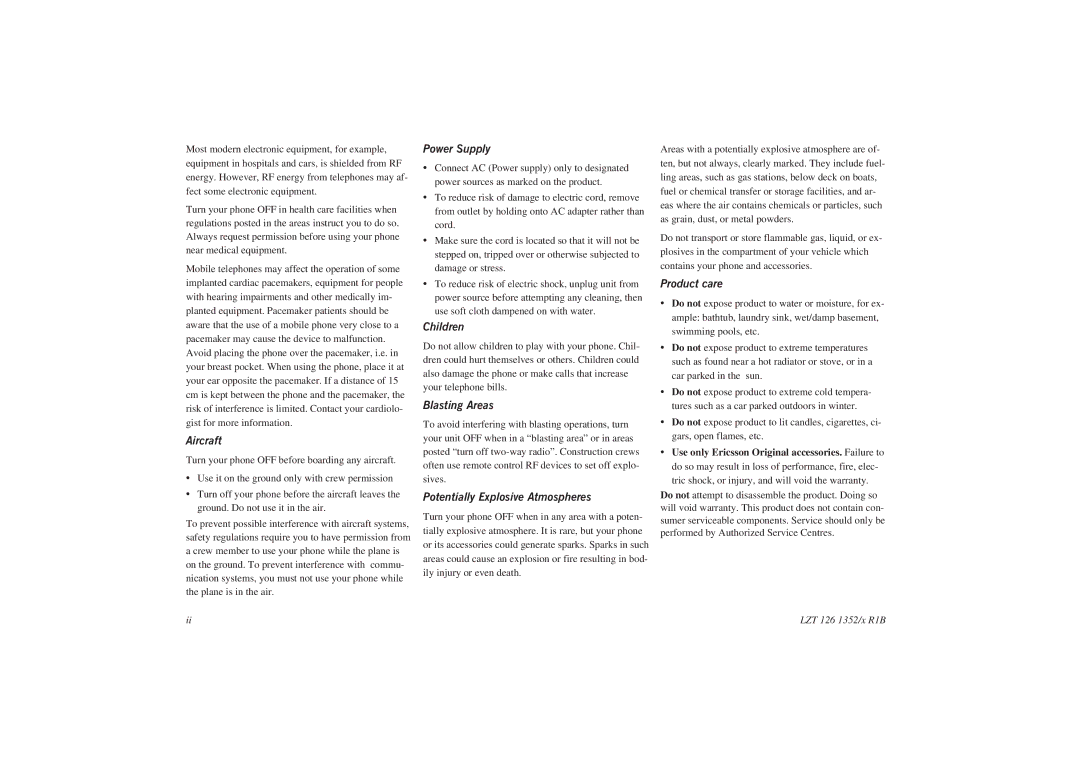Most modern electronic equipment, for example, equipment in hospitals and cars, is shielded from RF energy. However, RF energy from telephones may af- fect some electronic equipment.
Turn your phone OFF in health care facilities when regulations posted in the areas instruct you to do so. Always request permission before using your phone near medical equipment.
Mobile telephones may affect the operation of some implanted cardiac pacemakers, equipment for people with hearing impairments and other medically im- planted equipment. Pacemaker patients should be aware that the use of a mobile phone very close to a pacemaker may cause the device to malfunction. Avoid placing the phone over the pacemaker, i.e. in your breast pocket. When using the phone, place it at your ear opposite the pacemaker. If a distance of 15 cm is kept between the phone and the pacemaker, the risk of interference is limited. Contact your cardiolo- gist for more information.
Aircraft
Turn your phone OFF before boarding any aircraft.
•Use it on the ground only with crew permission
•Turn off your phone before the aircraft leaves the ground. Do not use it in the air.
To prevent possible interference with aircraft systems, safety regulations require you to have permission from a crew member to use your phone while the plane is on the ground. To prevent interference with commu- nication systems, you must not use your phone while the plane is in the air.
Power Supply
•Connect AC (Power supply) only to designated power sources as marked on the product.
•To reduce risk of damage to electric cord, remove from outlet by holding onto AC adapter rather than cord.
•Make sure the cord is located so that it will not be stepped on, tripped over or otherwise subjected to damage or stress.
•To reduce risk of electric shock, unplug unit from power source before attempting any cleaning, then use soft cloth dampened on with water.
Children
Do not allow children to play with your phone. Chil- dren could hurt themselves or others. Children could also damage the phone or make calls that increase your telephone bills.
Blasting Areas
To avoid interfering with blasting operations, turn your unit OFF when in a “blasting area” or in areas posted “turn off
Potentially Explosive Atmospheres
Turn your phone OFF when in any area with a poten- tially explosive atmosphere. It is rare, but your phone or its accessories could generate sparks. Sparks in such areas could cause an explosion or fire resulting in bod- ily injury or even death.
Areas with a potentially explosive atmosphere are of- ten, but not always, clearly marked. They include fuel- ling areas, such as gas stations, below deck on boats, fuel or chemical transfer or storage facilities, and ar- eas where the air contains chemicals or particles, such as grain, dust, or metal powders.
Do not transport or store flammable gas, liquid, or ex- plosives in the compartment of your vehicle which contains your phone and accessories.
Product care
•Do not expose product to water or moisture, for ex- ample: bathtub, laundry sink, wet/damp basement, swimming pools, etc.
•Do not expose product to extreme temperatures such as found near a hot radiator or stove, or in a car parked in the sun.
•Do not expose product to extreme cold tempera- tures such as a car parked outdoors in winter.
•Do not expose product to lit candles, cigarettes, ci- gars, open flames, etc.
•Use only Ericsson Original accessories. Failure to do so may result in loss of performance, fire, elec- tric shock, or injury, and will void the warranty.
Do not attempt to disassemble the product. Doing so will void warranty. This product does not contain con- sumer serviceable components. Service should only be performed by Authorized Service Centres.
ii | LZT 126 1352/x R1B |
